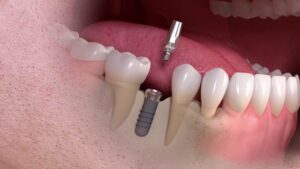Are Dental Implants Painful?
Have you thought about getting an implant for one or more of your missing teeth? That is understandable. Everyone wants to have that great smile and this is possible. Your smile affects you how feel about yourself. It affects your confidence and self-esteem. If you are missing one or more teeth, it is understandable that you want to get it back. The good news is that, for most people, dental implants are possible. You might be able to have your tooth or teeth replaced and get your smile back.
It is important to know that dental implants aren’t bridges or dentures. While they are able to do the same thing, fill in your gaps, dental implants will involve surgery and a healing process. Patients need to know that there is a procedure when it comes to dental implants. Depending on the patient, there are varying levels of pain that can be expected. Before you get the procedure, it might be helpful to know more about what you can expect. Is Surgery Going to Be Painful?
Is Surgery Going to Be Painful?
Are you thinking about getting dental implants? If so, you may first want to know more about the surgery process.
There are multiple parts to this procedure. The first thing that will be done is your dental implant surgery. After you get your surgery done, you will have a recovery process. The recovery process is not the same for everyone.
The surgery that you get is going to be done by a dentist on our team. The dentist will start by cutting into your gums. This part should not cause you pain and discomfort. Before the surgery begins, a local anesthetic will be used. Similar to the process of getting a filling, the area will be fully numb. This will help to reduce the pain that you experience. Once the area of your mouth is numb, your dentist will cut an incision to create exposure to your jawbone. You shouldn’t feel pain at this time due to the local anesthetic. However, if you do feel pain, be sure to say something to your dentist, so they can provide more relief for you during this procedure. Some people are more sensitive to procedures involving the teeth and mouth, so they might need more anesthetic than others.
After the dentist has created more exposure, they will be able to drill a hole for the dental implant. Drilling into your mouth might sound like it will be painful. However, due to the local anesthetic, your jawbone should not feel pain since the nerves have been numbed. With this being said, you might still feel some pressure during this part of the procedure. You shouldn’t feel the drilling itself.
Once this part of the procedure has been finished, your dentist will screw the dental implant into the proper place.
Between the numbing process, doing the incision, drilling the hole, and placing the implants, and screwing the implants into place, you will be in the procedure room for about 1 hour. After your dentist has completed the placement, they will check out the incision area very closely. The dentist wants to make sure everything is in place and ready for the recovery and healing process.
The local anesthetic will still be in effect for a bit. While it is still working, you shouldn’t experience pain. Pain medication might be given to you by your dentist before the procedure has begun. This way, after the local anesthetic has worn off, you will still have some pain relief. This is the point when your healing process is going to begin.
What Expectations Can You Have for the Healing Process?

Patient girl holding an x-ray picture of her teeth. Bad teeth affected by caries, require replacement by new implants.
After the local anesthetic wears off, you will probably have tenderness and discomfort in your mouth. For most patients, this discomfort is not severe and it can be managed. Most of the time over the counter medications for pain relief will be recommended by the dentist. These over the counter medications can help to ease discomfort while the patient is healing from the surgery.
It is important that you pay attention to and follow all aftercare recommendations and guidelines that are provided by your dentist. Some of these recommendations and guidelines that your dentist might give you include:
- Expect minimal swelling around the area for up to 3 days
- Don’t use any straws for 1 day after your surgery
- The day after your surgery you should rinse your mouth 3 to 4 times a day with salt water until the healing process is complete
- Don’t eat food that is too hot within the first 2 days after your surgery
- Eat only a liquid diet for the first 1 to 2 days after your surgery
- Don’t smoke for a minimum of 3 days after your surgery
- Use over the counter pain relief medications, such as Tylenol, for the discomfort experienced during the healing process
- Call your dental office if you have any concerns after your surgery or during the healing process
These are some of the recommendations and guidelines that you might be given by your dentist following your dental implant surgery. Be sure to follow anything that your dentist tells you. By doing so, you can help to prevent complications from occurring during your healing and recovery process.
Does Everyone Experience the Same Recovery Process?
It is important to know that everyone will not experience the same recovery process. In fact, the healing process can be different from one person to the next. With this being said, most people do not experience anything more than mild pain or discomfort during their surgery and recovery process. If you do happen to experience moderate to severe pain, especially if it has been days since your surgery, you should get medical attention immediately. You can also contact your dentist right away to see if they can get you in for a follow-up appointment quickly.
While many people consider surgery painful and scary, when it comes to dental implant surgery, there aren’t usually many complications. Most patients don’t experience a painful recovery. The healing process is usually fairly quick. The majority of patients won’t experience any more pain than they would have if a tooth had been extracted.
While everyone does have their own unique experience with the recovery process of dental implant surgery, the majority of patients have a good recovery process.
Should You Get Dental Implant Surgery?
Have you thought about getting dental implant surgery? If so, the first thing that you need to do is to make an appointment to speak to your dentist. The dentist will offer you the information that you need about dental implant surgery at their facility. They will talk to you about the things that you can expect in your individual case. The dentist will also speak to you about any aftercare instructions they might have for you. The dental office will talk to you about the cost of the dental implant surgery, based on what your insurance covers (if you have any insurance) or what out-of-pocket expenses you might have. If dental implant surgery isn’t for you, your dentist can talk to you about other possible solutions.
Not everyone should or is able to get dental implant surgery. There are certain patients that need other procedures, as well. Sinus lifts and bone grafts are 2 of the most common procedures that patients often get to improve the quality of their jaw bone. If you have had dentures for many years, your dentist might tell you that these procedures are needed to improve your jaw bone before you can have dental implant surgery. Bone loss happens to many people who wear dentures. In some cases, people who have worn dentures for a long time can’t get dental implant surgery.
During your consultation appointment, the dentist is going to look into your mouth. They will assess the quality of your jaw bone, gums, and teeth. After this assessment, the dentist will let you know if you can get dental implant surgery. If they determine that you can’t get this surgery right now, they will let you know if it is something that can be considered later on. In addition to this assessment, your dentist will make a plan for any treatments which might include sinus lifts, bone grafts, or dental implant surgery, if possible.
Conclusion
Surgery, of any type, can be a scary thought. When it comes to dental implant surgery, you might be concerned about the dentist cutting into your mouth. You might be worried about sutures and the healing process. With all of this in mind, it is important to remember that dental implant surgery is more common than you might think. Most patients have no issues with the surgery or the recovery process. A local anesthetic is used during the surgery. Over the counter pain relief medications are recommended after the surgery. Both of these things often help with any discomfort or pain the patient might experience.
If you are thinking about having dental implant surgery or you have any questions about this type of procedure, you should talk to the dentist or dental team at Dr. Molly Rodgers Dental – Edmonton Smiles today.


